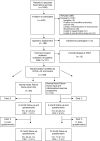A randomized trial of the addition of home-based exercise to specialist heart failure nurse care: the Birmingham Rehabilitation Uptake Maximisation study for patients with Congestive Heart Failure (BRUM-CHF) study
- PMID: 19168520
- PMCID: PMC2639417
- DOI: 10.1093/eurjhf/hfn029
A randomized trial of the addition of home-based exercise to specialist heart failure nurse care: the Birmingham Rehabilitation Uptake Maximisation study for patients with Congestive Heart Failure (BRUM-CHF) study
Abstract
Aims: Supervised exercise can benefit selected patients with heart failure, however the effectiveness of home-based exercise remains uncertain. We aimed to assess the effectiveness of a home-based exercise programme in addition to specialist heart failure nurse care.
Methods and results: This was a randomized controlled trial of a home-based walking and resistance exercise programme plus specialist nurse care (n=84) compared with specialist nurse care alone (n=85) in a heart failure population in the West Midlands, UK.
Primary outcome: Minnesota Living with Heart Failure Questionnaire (MLwHFQ) at 6 and 12 months.
Secondary outcomes: composite of death, hospital admission with heart failure or myocardial infarction; psychological well-being; generic quality of life (EQ-5D); exercise capacity. There was no statistically significant difference between groups in the MLwHFQ at 6 month (mean, 95% CI) (-2.53, -7.87 to 2.80) and 12 month (-0.55, -5.87 to 4.76) follow-up or secondary outcomes with the exception of a higher EQ-5D score (0.11, 0.04 to 0.18) at 6 months and lower Hospital Anxiety and Depression Scale score (-1.07, -2.00 to -0.14) at 12 months, in favour of the exercise group. At 6 months, the control group showed deterioration in physical activity, exercise capacity, and generic quality of life.
Conclusion: Home-based exercise training programmes may not be appropriate for community-based heart failure patients.
Figures
References
-
- van Tol BAF, Huijsmans RJ, Kroon DW, Schothorst M, Kwakkal G. Effects of exercise training on cardiac performance, exercise capacity and quality of life in patients with heart failure: a meta-analysis. Eur J Heart Fail. 2006;8:841–850. - PubMed
Publication types
MeSH terms
Grants and funding
LinkOut - more resources
Full Text Sources
Medical


